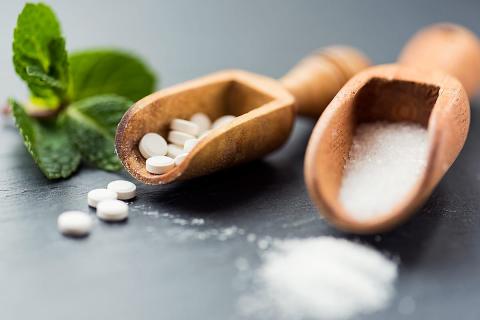
Aspartame has long been the choice of diet soft drink companies, but it has created quite a stir over the last decade due to the large number of studies showing its links to the growth of cancerous tumours, at least in rats. As a result, many producers of sugar-free products have begun to investigate alternative sweeteners like sucralose, sugar alcohols (maltitol, erythritol, xylitol and lactitol), and of course, the stevia plant.
Stevia – Too good to be true?
Contrary to its name, a sugar alcohol is neither a sugar nor a beverage. Sugar alcohols occur naturally in fruit, but can be manufactured by the hydrogenation of sugars. This changes their chemical structure and in turn, makes them indigestible in the human gastrointestinal system. As such, the sugars pass through the gut without being absorbed, therefore avoiding any effect on blood glucose levels. One side effect of this is the production of excess gas, causing bloating and - if consumed in large amounts - diarrhoea. Sugar alcohols are safe to ingest in small amounts, but anyone with irritable bowel syndrome (IBS) may experience symptoms with even a small amount.
Steviol glycosides (the active component extracted from the leaf) have a negligible effect on blood glucose levels and do not cause bloating and gas like artificial sweeteners and sugar alcohols, making stevia the preferred choice for diabetics and the health conscious. There has been some talk about stevia consumption impacting fertility, but there have been no long term or follow up studies to back this claim. In short, like everything we consume, it should be used in moderation. There is also some debate over the notion that the sweet taste of any sweetener, regardless of its caloric content, can trigger insulin secretion. Just as tasting something bitter stimulates digestive secretions, tasting something sweet can stimulate insulin and, long term, possibly have a negative effect on blood glucose levels. If insulin is secreted when blood sugars are not high, this can result in hypoglycaemia (low blood sugar), which causes dizziness, disorientation, confusion, blurred vision, and fatigue. This is another reason to use sweeteners sparingly: remember, it’s not a free-for-all, just because it’s low calorie.
Diana Robinson is a qualified nutritionist and health expert. www.dianarobinsonnutrition.com
Diana Robinson is our Nutritionist and regularly features in Nature and Health magazine.
Author: Diana Robinson.
Original Publication: Nature and Health magazine – The sweet spot - page 53.



